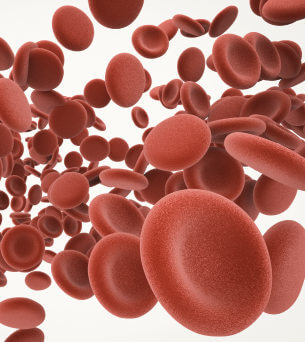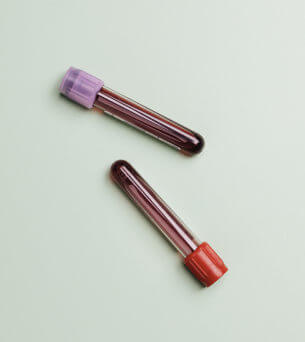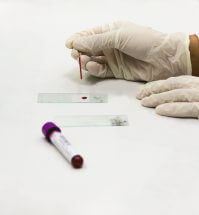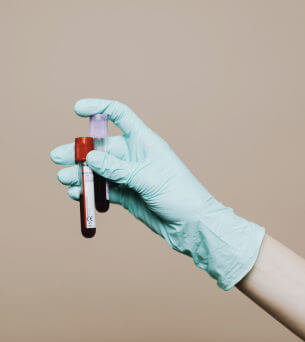Getting blood drawn isn’t for fun. You do it because it’s necessary. Maybe you’re showing symptoms of an illness, and your doctor has ordered it. Or perhaps it’s preventive, to keep tabs on your health. What is blood testing, and when is it necessary? And what about the costs? Is blood testing without a referral covered by your insurance, or does it count towards your deductible? We’ve looked into it for you.

What is blood testing?
To start at the beginning: every adult with an average weight has between 5 and 7.5 liters of blood in their body, transporting fuels to our cells and removing waste. Women tend to have less blood volume than men. Blood is the barometer of our health. By having blood drawn, a doctor can gather more information about your overall health condition and determine if there are certain conditions or infections present. They can examine the components of the blood and various other substances to see if there are harmful deficiencies or excesses.


Blood testing helps doctors with initial diagnosis because deviations from standard values indicate that something is amiss. When blood testing is repeated later in the treatment process, it can determine if the medication/treatment is effective or not. Thus, blood testing plays a crucial role in making a diagnosis and determining the course of the disease and the effect of treatment.
Doctors don’t rely solely on blood testing. The results of blood tests must always be seen in the context of the person as a whole. Factors such as age, medical history, medication use, and the symptoms experienced all play a role in making a diagnosis.
When is blood testing necessary?
A general blood test can be performed by the general practitioner as part of a routine check-up, for example, if there’s a chronic illness present. Blood testing can also be used when there are unexplained symptoms, such as fatigue, shortness of breath, or fever. In such cases, blood testing can provide clarification by ruling out or confirming diagnoses. The blood values determined during the test depend on what the doctor wants to know exactly.
For instance, infections leave traces in the blood. But there may also be indications that there’s something wrong with the blood components themselves. For example, if you have symptoms that could indicate anemia, such as fatigue, shortness of breath, and dizziness, it could be due to an iron deficiency. Leukemia, chemotherapy, hereditary diseases, or bleeding can reduce the number of blood platelets (thrombocytes) in the blood. And then there are the different types of white blood cells, which protect the body against infections and remove dead cells. These cells can also be examined with a blood test.



There are hundreds of values that can be tested. Obviously, this can’t be done with a single blood test. It’s common for various blood tests to be performed in the laboratory. Here are some of the most common ones:
- Glucose test: This determines your blood sugar level. It’s done in people with diabetes or when there’s suspicion of diabetes.
- ESR or sedimentation rate: Together with a CRP test, it can determine if you have inflammation.
- An Hb test can be used to check for anemia.
- The T4 test assesses the functioning of your thyroid.
- A PSA test is used to determine if PSA levels are elevated. If so, it could indicate prostate cancer.
Related tests



What is preventive blood testing?
When experiencing clear health issues, a doctor or specialist will order blood tests themselves. But what about when you’re not yet sick, but you want to understand potential future health problems? How do you find out if your vital organs are still functioning well, if your immune system is up to par, and if you may have a deficiency in vitamins and minerals? In that case, you can opt for preventive blood testing, for example, by doing an Easly blood panel test. You don’t need a referral from a doctor for this. The benefit: you quickly know if your blood is in balance. And if it’s not, you can take steps to address the issue. Perhaps you decide to adjust your lifestyle. Later, the blood test can be repeated to see if this has had an effect. After all, prevention is better than cure.
Where can you get your blood tested?
During a general blood test, the most important blood values are measured. The size, shape, concentration, and absolute numbers of red and white blood cells are examined, as well as the number of platelets in your blood. Do your blood values fall within the range of standard values? In that case, you’re in good shape. When deviations are detected, it’s a sign that something might be wrong. In such cases, further investigation, treatment, or advice to adjust lifestyle and/or dietary habits may follow.
In addition to the components of blood – red and white blood cells, and platelets – there’s much more to see in the blood. Many of these indicators can be measured with a self-test. It’s possible to test for cholesterol, diabetes, heart and vascular diseases, liver function, kidney function, and thyroid function. There are also self-tests to measure the amount of vitamin D and vitamin B12 in the blood. You simply prick your finger at home and send the blood sample in the return envelope to Easly’s laboratory. Within two days, you can then view the results in an online environment.


Can you get blood tested without referral, and is It covered?
When you’re sick, you naturally go to the doctor. However, for preventive blood testing, there are faster alternatives available: self-tests that you can easily administer at home. Of course, all blood tests incur costs, although self-tests are cheaper and less time-consuming. This raises the question: is blood testing covered by the basic insurance? Or does getting blood drawn without a referral count towards your deductible? The answer to this question is straightforward at first glance. Blood testing with a referral from a doctor is usually covered by your insurer. For the cost of a blood test without a referral, you’re responsible yourself.

Preventive blood testing is only covered when you have an increased risk of certain diseases. It must then be requested by a doctor. If you take the initiative yourself, you’ll have to pay for the self-test. However, this doesn’t necessarily mean that a self-test is more expensive. It’s entirely possible that blood testing with a referral falls within your deductible. In that case, you’ll have to pay the costs regardless. A preventive self-test can then be a good alternative. Note: in case of complaints, the general practitioner or specialist remains the first point of contact. A self-test is not a substitute for medical examination or advice in case of illness.
How much does a general blood test cost?
A preventive general blood test doesn’t have to be expensive. Easly’s general blood test costs only €59.95. In four simple steps – order the package, perform the at-home self-test, return the test, and check the results online after 36 to 48 hours – you’ll know exactly where you stand. When all values fall within the standard ranges, it’s a reassuring thought. Even when there are minor deviations, it’s nice to know where you stand. Then you can seek advice or assistance, or make adjustments to your lifestyle yourself. For example, if you have high cholesterol.
The old cliché is true: measuring is knowing. And knowing is all the more important when it comes to your health, perhaps your most important asset. Preventive blood testing is therefore an important pillar of a healthy and conscious lifestyle.







